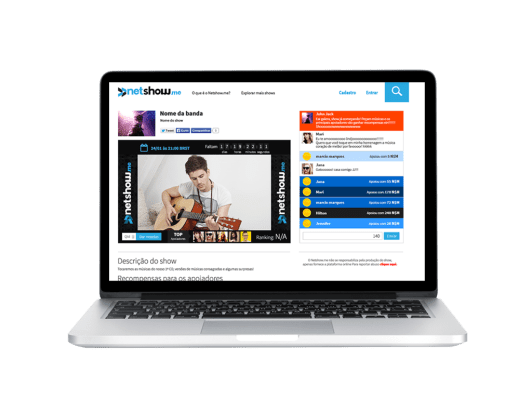Tired of ticket fees, sweaty seething masses of teeming humanity, clubs that smell of body odor and stale beer, and concerts that sell out before you can even take out your credit card?
Well, if you live in Brazil, Netshow.me has a solution for you. The company is offering an online concert service for artists and musicians, much like StageIt, and has just raised a seed round of financing.
Netshow.me launched its online concert broadcasting service six months ago, and on the back of its growth was able to attract the attention of none other than Rodrigo Borges, the co-founder of one of Brazil’s most successful startups — Buscape.
“Most of my decisions to invest in companies are based on the entrepreneurs. The business model, the product, everything else you can change, but the entrepreneur you can’t change. And it makes a completely total difference if you don’t have a good entrepreneur,” says Borges.
With Netshow.me’s co-founders Borges believes he’s found the right startup men for the job. “They are learning very fast, they understand how the entertainment market works and they have good results.”
It’s not like the brains behind Netshow.me are wet-behind-the-ears newbies to the investment game. Daniel Arcoverde do Nascimento and his partner Rafael Belmonte left behind investment careers at the Brazilian financial management company Bravia Capital Investimentos. 
“We’ve been generating revenue since the beginning,” says Nascimento. “We were learning about the platform and learning in terms of user experience and how the fans reacted to the platforms and to the concerts…. Next month we’re going to raise to have 30,000 to 40,000 reals in revenue.”
Netshow.me makes its money by taking a cut of the ticket sales and tips that fans leave at the end of each show. Artists can take from 52 percent to 72 percent of the total gross from a show and tips, while Netshow.me’s cut will range from 28 percent to 48 percent depending on the size of the band, Nascimento says.
“Here in Brazil we have two main problems,” says Borges. “It’s difficult to go to shows, because public transportation is bad and security is bad. On top of that it’s expensive.”
Beyond Brazil’s large cities music fans don’t have access to see popular concerts, says Borges. “It’s a way to allow these people to have access to a band they like. On the other side, for the bands, it’s a no-brainer because they can make a lot more money.”
